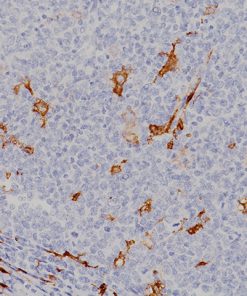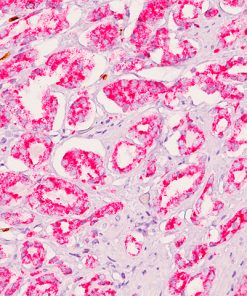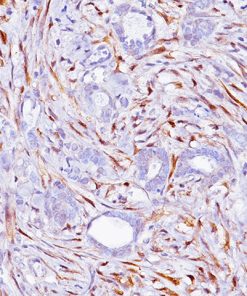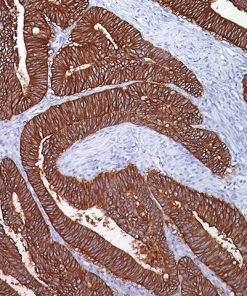Desmoglein 3 + p40 (M)
$705.00
Description
Product Description
Desmoglein 3 (DSG3) is a calcium-binding transmembrane glycoprotein component of desmosomes in vertebrate epithelial cells. Currently, three desmoglein subfamily members have been identified and all are members of the cadherin cell adhesion molecule superfamily (1,2). Desmogleins exhibit membranous expression and connect with cytokeratins through desmoplakins and plakoglobin. DSG3 is particularly important in the cellular adhesion of squamous epithelium, and as a result, it is often highly expressed in various squamous cell carcinomas (SqCC) (3). In lung squamous cell carcinoma specifically, DSG3 has demonstrated a sensitivity of 85-100%, and an ability to discriminate lung adenocarcinoma with a specificity of 98-100% (3-6).
The mouse monoclonal antibody p40 [BC28] recognizes an epitope unique to the p40 protein and may have applications in cases where p63 has traditionally been used. To date, p63 [4A4] has been a frequently used marker for lung SqCC, as well as for bladder,and p40 proteins (7). As a result, p63 [4A4] has proven to be a sensitive marker for lung SqCC; however, it suffers from specificity limitations due to reactivity in a subset of lung adenocarcinomas (ADC). In contrast, p40 is selectively expressed in lung SqCC, offering an opportunity for improved specificity (5,7,8). p40 (M) [BC28] recognizes an epitope unique to p40, which may result in diminished reactivity in lung ADC and increased specificity.
In several studies, staining with a rabbit polyclonal anti-p40 antibody was equivalent to p63 [4A4] in sensitivity for lung SqCC, but p40 exhibited markedly superior specificity due to staining in fewer cases of lung ADC compared to p63 (5,7-9). In an in-house study, Biocare’s mouse monoclonal anti-p40 [BC28] demonstrated similar sensitivity and specificity as the rabbit polyclonal antibody, staining 97% (65/67) of lung SqCC cases and 0% (0/71) of lung ADC cases; however, p40 expression may be observed with either antibody in select cases of lung ADC. The combination of both membrane and nuclear staining of DSG3 and p40, respectively, may increase overall sensitivity for lung SqCC, and in some cases, may aid the pathologist with difficult cytology and surgical specimens (5).
Specifications
Specifications
| Intended Use | |
|---|---|
| Format | |
| Source | |
| Clone | |
| Isotype | |
| Antigen | |
| Localization | |
| Species Reactivity |
References
1. Buxton RS, Magee AI. Structure and interactions of desmosomal and other cadherins. Semin Cell Biol. 1992 Jun; 3(3):157-67. 2. North AJ, et al. Molecular map of the desmosomal plaque. J Cell Sci. 1999 Dec; 112 ( Pt 23):4325-36. 3. Savci-Heijink CD, et al. The role of desmoglein-3 in the diagnosis of squamous cell carcinoma of the lung. Am J Pathol. 2009 May; 174(5):1629-37. 4. Tacha D, et al. A six antibody panel for the classification of lung adenocarcinoma versus squamous cell carcinoma. Appl Immunohistochem Mol Morphol. 2012 May; 20 (3):201-7. 5. Brown AF, et al. Tissue-preserving antibody cocktails to differentiate primary squamous cell carcinoma, adenocarcinoma, and small cell carcinoma of lung. Arch Pathol Lab Med. 2013 Sep; 137(9):1274-81. 6. Agackiran Y, et al. Desmoglein-3 and Napsin A double stain, a useful immunohistochemical marker for differentiation of lung squamous cell carcinoma and adenocarcinoma from other subtypes. Appl Immunohistochem Mol Morphol. 2012 Jul; 20(4):350-5. 7. Bishop JA, et al. p40 is superior to p63 for the diagnosis of pulmonary squamous cell carcinoma. Mod Pathol. 2012 Mar; 25(3):405-15. 8. Hibi K, et al. AIS is an oncogene amplified in squamous cell carcinoma. Proc Natl Acad Sci U S A. 2000 May 9; 97(10):5462-7. 9. Pelosi G, et al. p40 and thyroid transcription factor-1 immunoreactivity on small biopsies or cellblocks for typing non-small cell lung cancer: a novel two-hit, sparingmaterial approach. J Thorac Oncol. 2012 Feb; 7(2):281-90. 10. Center for Disease Control Manual. Guide: Safety Management, NO. CDC-22, Atlanta, GA. April 30, 1976 “Decontamination of Laboratory Sink Drains to Remove Azide Salts.” 11. Clinical and Laboratory Standards Institute (CLSI). Protection of Laboratory workers from Occupationally Acquired Infections; Approved guideline-Third Edition CLSI document M29-A3 Wayne, PA 2005.
Datasheet & SDS
| Download Data Sheet |
| SDS Sheet |
Browse more documents for this product (IFUs, datasheets, translations, SDS, and more).






